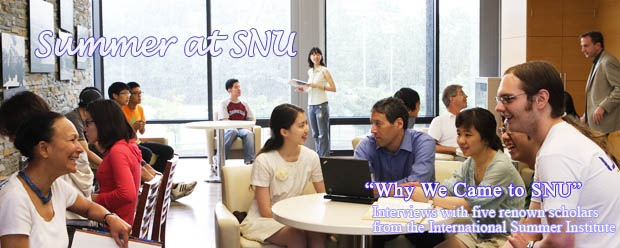
We had a chance to talk with five world-renown scholars who were invited to the 2008 International Summer Institute, and while most of them admitted that they were surprised that they were chosen to teach at SNU, all were inclined to agree that it was an excellent choice to accept the offer. The chance to work with top experts in the field, an intense, well-structured program, enthusiastic students, devoted TAs, and excellent on-campus housing were among the positives that were noted. 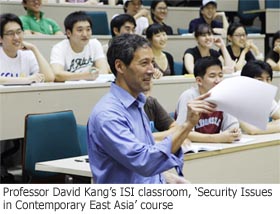 "It was a chance to teach with the best. I couldn't pass up the opportunity." David Kang, professor of business at Dartmouth, is an expert on North Korean policy and a regular consultant for the CIA, National Intelligence Council, and the US State Department. Professor Kang decided to join the program after receiving the list of invited academics."SNU is the best university in Korea, and I get to lecture with a team of the best, the kind you can't meet even in the US," remarked Kang."Really, I had no reason to turn down the offer, whatsoever."
"It was a chance to teach with the best. I couldn't pass up the opportunity." David Kang, professor of business at Dartmouth, is an expert on North Korean policy and a regular consultant for the CIA, National Intelligence Council, and the US State Department. Professor Kang decided to join the program after receiving the list of invited academics."SNU is the best university in Korea, and I get to lecture with a team of the best, the kind you can't meet even in the US," remarked Kang."Really, I had no reason to turn down the offer, whatsoever."
Dr. Kang's Security Issues in Contemporary East Asia class is the most popular course in this year's ISI. Students were quick to give Kang a thumbs-up as an interesting as well as tactful professor.
Kang remarked that Korean students have changed since the 90s, when he was first invited to Korea to teach as a guest lecturer."They were very passive back then", he reflects,"but now they're much more active in presentations and discussions, even more so than American students". 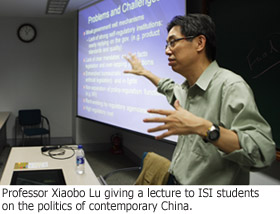 "I'm going to encourage some of the good students here to apply to my graduate program at Columbia" says Dr. Xiaobo Lu, professor of political science and director of the Weatherhead East Asian Institute at Columbia University. Though still relatively young, Lu is one of the world's most respected experts on Chinese politics. Forty-two students, more than for any other course, signed up for his Politics & Economy in Contemporary China class.
"I'm going to encourage some of the good students here to apply to my graduate program at Columbia" says Dr. Xiaobo Lu, professor of political science and director of the Weatherhead East Asian Institute at Columbia University. Though still relatively young, Lu is one of the world's most respected experts on Chinese politics. Forty-two students, more than for any other course, signed up for his Politics & Economy in Contemporary China class.
One of his many fans, Taek-jin Han, an SNU social sciences student, remarked"Dr. Lu never seems to stop. His lectures are really intense; you can't relax for a second." Dr. Lu, impressed by the bright students, is openly determined to recruit some of them to his graduate program at Columbia. He also mentioned that the summer program at SNU is unlike others, as it is more intense and serious than the relaxed atmosphere of summer school in the US. He said he would gladly return to teach again in the future if invited. 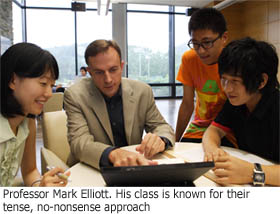 "SNU students are very attentive and polite." offered Dr. Mark Elliott, professor of Chinese and Inner Asian history at Harvard University, who specializes in the history of the Qing dynasty as well as modern relations between China and Inner Asia. His lectures introduced American research on modern Chinese history. In his lectures, he stresses that"the US views China as a threat, and China is the hottest subject in academic circles in America," as he reveals the findings of extensive research on China.
"SNU students are very attentive and polite." offered Dr. Mark Elliott, professor of Chinese and Inner Asian history at Harvard University, who specializes in the history of the Qing dynasty as well as modern relations between China and Inner Asia. His lectures introduced American research on modern Chinese history. In his lectures, he stresses that"the US views China as a threat, and China is the hottest subject in academic circles in America," as he reveals the findings of extensive research on China.
Dr. Elliott's lectures are famous for their tense, no-nonsense approach; TAs rigorously grade assignments, questions are met with more questions or an analytical retort before any answers are given, and drowsy students are sent out of the classroom."I send such students out at Harvard," explains Elliott."And the students here are up to Harvard standards. So I treat them the same." 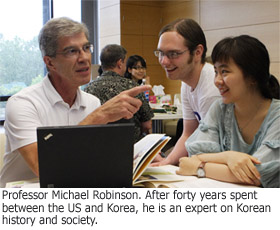 Dr. Michael Robinson, professor of history at Indiana University, says that"Korea has been rapidly modernized since I first came here." He first visited Korea in 1963 as a Peace Corps volunteer. While he knew close to nothing about Korea at that time, he was immediately taken by the poor, but open and friendly Korean people and decided to pursue a career studying Korean history. After forty years spent between the US and here, he is now considered an expert on Korea.
Dr. Michael Robinson, professor of history at Indiana University, says that"Korea has been rapidly modernized since I first came here." He first visited Korea in 1963 as a Peace Corps volunteer. While he knew close to nothing about Korea at that time, he was immediately taken by the poor, but open and friendly Korean people and decided to pursue a career studying Korean history. After forty years spent between the US and here, he is now considered an expert on Korea.
"Korea has developed with astonishing speed, but the people were friendlier 30 years ago," Dr. Robinson says in fluent Korean."At Indiana University, the majority of students taking my courses are non-Koreans," he says, with obvious pride in his Korean research. His colleagues point out that his lectures are well-known for being interesting and entertaining, and are always in popular demand.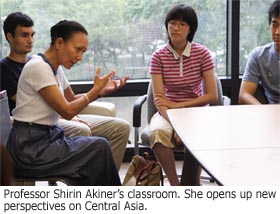 "They worked selflessly on the required presentations. Truly inspirational!" exclaimed Dr. Shirin Akiner, from London University's School of Oriental and African Studies. Dressed in an almost priestly garb, Dr. Akiner teaches Central Asian Culture and Religion. All but one student in her class are Asian. She teaches students who are more familiar with western civilization than their Asian roots, and opens up new perspectives on Islamic culture.
"They worked selflessly on the required presentations. Truly inspirational!" exclaimed Dr. Shirin Akiner, from London University's School of Oriental and African Studies. Dressed in an almost priestly garb, Dr. Akiner teaches Central Asian Culture and Religion. All but one student in her class are Asian. She teaches students who are more familiar with western civilization than their Asian roots, and opens up new perspectives on Islamic culture.
Just as she stresses the variety and interaction of cultures, the class is conducted in a discussion-style manner, with all the participants sitting in a circle. She is attentive to any questions, hearing them out carefully until the end. In response to a question about Confucianism in Korea by Luke, a student from Manchester University, Dr. Akiner pointed out that with a little interest and observation, you can find similarities between even the most exotic cultures.
The 2008 International Summer Institute is in its second year, with the program this year proceeding for six weeks ending July 30th.
July 25, 2008
SNU PR Office
SNU NOW
News
News

